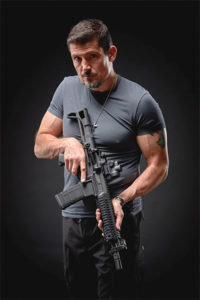ADAM PAINCHAUD: Most people who continue to educate themselves and train understand the mindset of avoiding any incident in the first place. What are some of the approaches you take in this area of avoiding or minimizing engagement?
KRIS PARONTO: The first thing you want to do is not get in a gunfight. You don’t want to be in that situation. If you’ve gotten into that situation, your awareness has failed you. You need to get your head out of your cellphone, look around every once in a while, and see your surroundings. That right there, you being attentive and having attention to detail and looking around will help you not get attacked. They’re going to go to somewhere else because you look like a difficult target. Be a difficult target. That’s the biggest thing in the world right there.
 Look around and see little that may be going wrong. If you’re looking for things that may be out of the ordinary, people standing there, people dressed incorrectly and you see in the movies or you see it on TV that there’s somebody that maybe overdressed for a situation, that’s actually accurate. If it’s hot outside and this guys wearing a coat, pay attention a little bit more, see what’s going on. Where are his hands? Are they in his pockets? Are they fidgeting? Does he look nervous?
Look around and see little that may be going wrong. If you’re looking for things that may be out of the ordinary, people standing there, people dressed incorrectly and you see in the movies or you see it on TV that there’s somebody that maybe overdressed for a situation, that’s actually accurate. If it’s hot outside and this guys wearing a coat, pay attention a little bit more, see what’s going on. Where are his hands? Are they in his pockets? Are they fidgeting? Does he look nervous?
Suicide bombers look nervous. They do. I’ve seen them. They look nervous. They’re not cool as a cucumber. You can pick these little things out. Your spider senses will tingle. When that happens then you need to pay more attention. I never tell people get out of the area. Don’t. I do have many people that get out of the area.
Now, if it’s an IED or something or a bomb, yes, get out of there. But if it’s somebody that may look like they’re going to hurt somebody else, you don’t need to intervene at that point, just stay there. Stay there. Don’t excuse yourself from the situation and then watch your fellow citizen get attacked. Maybe that’s the wrong thing to pick people out. Well, that’s not the wrong thing. No, that’s not the proper thing. People don’t want to get taught like that.
I always tell people. You have to be able to be there to maybe sometimes be the sheep dog and able to protect. And if you see something out of the ordinary, you don’t need to focus on it, but maybe let that other person know just by looking up and kind of give in in a glance. Hey, I’m kind of watching you. It may be nothing, but err on the side of caution. It’s just keeping your eyes open, keeping your head up. If you’re on your cellphone, pick your head up every once in a while and look and see what’s going on.
And the second thing is go train with whatever weapon system you have and also do full spectrum training. Do your night training. Get your club training. Get your weapon, of course, get your pistol training. You have to be able to handle yourself or be able to defend against all those different sorts of weapon systems or handle those weapon systems. The scariest thing in the world is the knife coming at you. I hope nobody ever has to experience it, but if you ever have a knife pulled on you or a gun pulled on you, for some reason that knife maybe it’s a primal thing, that knife really shocks you more than that gun. It shocks you being cut than being shot. I don’t know what that is. Again, maybe it’s that deep down primal instinct.
I tell people also, don’t just train on your weapon system. Do some knife training too. Do some combative stuff too. Get somebody to train with. You get some stick training. Do other things than just go out in your range and punching targets and you also raise your confidence levels up and you will become attentive to what’s going on in your surroundings, and that’s the biggest thing right there.
What did you think about this in-depth look at in-the-trenches training? What do you think about the level of preparedness and awareness needed in these situations? How do you think these concepts can be applied to your life? Share your thoughts below.
Adam Painchaud is one of the most highly regarded small unit tactics and advanced firearms instructors in America. He is Army Ranger and Airborne qualified. Adam is a senior non-commissioned officer with nearly 22 years of experience in both active duty and reserves. He has completed federal investigations as well as protective services missions worldwide including missions for the war against terrorism.
Adam has since transitioned to being the President and Co-Founder of E3 Firearms Association, as he continues to serve as a police officer. Adam remains active helping with training agencies, SWAT teams, and the community. He is dedicated to making a positive difference in the firearms community and in people’s lives. Adam is the driving force behind E3 Firearms Association.
